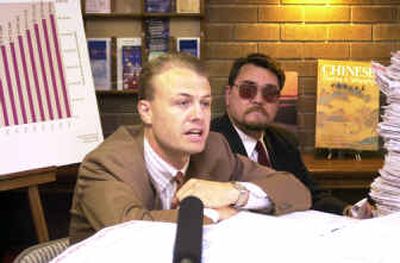The big six

Election reform
In the wake of Washington state’s closest-ever governor’s race, Secretary of State Sam Reed and several lawmakers are proposing a laundry list of changes to the state’s election system. Among them: shifting Washington’s September primary back to May, so officials would have more time to prepare for close primary races and recounts.
Where things stand: Tax rebel Tim Eyman took the spotlight last week, complaining that some of the proposals would make it harder for people to get initiatives and referenda on the ballot. He spent $5 on a counterattack, plunking down the filing fee for an initiative that would prevent lawmakers from changing the rules for ballot measures.
Education
Teachers and other school staffers hope lawmakers will reinstate Initiatives 728 and 732, which were suspended two years ago to save money. The measures were supposed to steer hundreds of millions of dollars more into teacher salaries and shrinking class sizes.
Where things stand: Several education leaders are urging the state to raise taxes for schools, saying that a well-educated population is critical to the state’s success. Some lawmakers are also trying to change the “supermajority” requirement for school levies and bonds. The change – shot down repeatedly in recent years – would make it easier for school districts to raise money for expenses such as roof repairs, extracurricular activities and new schools.
Liability reforms
Everyone seems to agree that liability insurance costs much more than it used to and that something should be done. Agreement ends there. There are dueling initiatives to the Legislature, one favoring doctors’ solution – a cap on jury awards for pain and suffering in liability cases – and the other leaning toward lawyers’ proposal, which includes better discipline of bad doctors.
Where things stand: The House Health Care committee will hold a hearing Tuesday on bills aimed at improving patient safety. Among them: requiring public disclosure and analysis of “adverse events,” and mandating reporting of infections acquired in health care facilities.
Business
Business groups want an overhaul of the workers’ compensation program for injured employees. They say it’s too expensive and biased toward employees’ versions of what happened. Some industries will also likely seek tax breaks – or try to stave off efforts to toss out old tax breaks.
Where things stand: Three Spokane-area chambers of commerce sent over a 75-person delegation last week to press their business agenda on lawmakers and the governor. A key point: that border communities like Spokane and Vancouver, Wash., face more competitive stresses than geographically insulated areas like Bellevue. Gov. Gregoire also hinted at a news conference Thursday that she wants to raise the threshold at which small businesses start paying the state’s “business and occupations” tax. The change she envisions would save small businesses statewide $52 million over the next two years.
Health care
Democrats want to expand the state’s low-cost insurance program for children. They’re also considering proposals to increase Medicaid reimbursements to doctors who treat the poor and to help small businesses afford to offer health insurance to their employees.
Where things stand: Bills up for hearings this week include one to ban giving vaccines containing mercury to children and pregnant women and another to tax cosmetic surgery. The House Appropriations committee Wednesday will discuss long-term care for Medicaid patients and a proposal to expand drug and alcohol treatment.
Taxes and fees
New taxes are critical to avoid lasting damage to the state’s schools, colleges and social services, lame-duck Gov. Gary Locke said. No way, say Republicans, who maintain that new taxes would hurt the economy.
Where things stand: Gregoire made it clear last week that she’s looking to eliminate some old tax breaks. And a House committee is devoting weeks to hearings on how to fix the state’s tax structure, which relies heavily on the sales tax and a uniquely complex business tax system. Bill Gates Sr. opined last week that the state’s tax system is “unconscionable.”